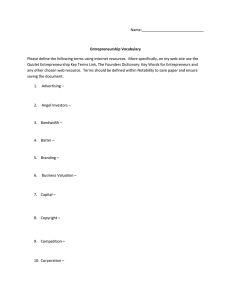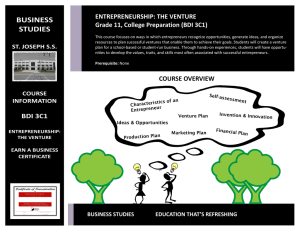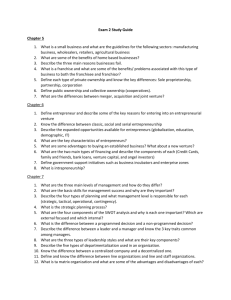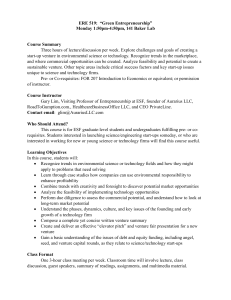BA551
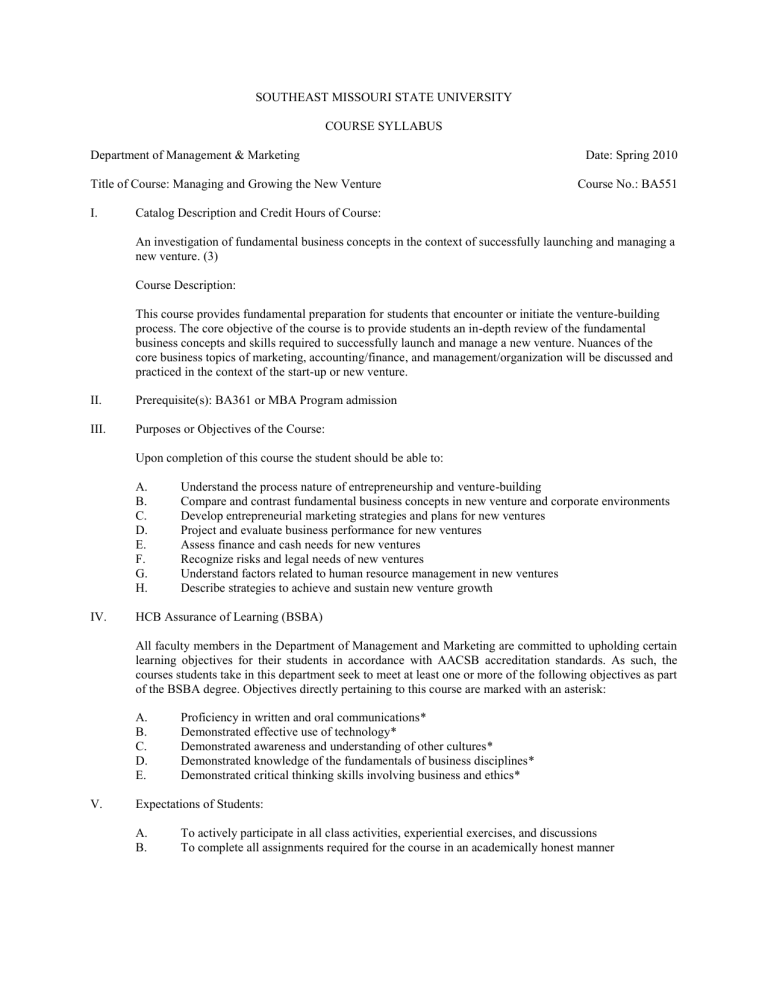
SOUTHEAST MISSOURI STATE UNIVERSITY
COURSE SYLLABUS
Department of Management & Marketing Date: Spring 2010
Title of Course: Managing and Growing the New Venture
I. Catalog Description and Credit Hours of Course:
Course No.: BA551
An investigation of fundamental business concepts in the context of successfully launching and managing a new venture. (3)
Course Description:
This course provides fundamental preparation for students that encounter or initiate the venture-building process. The core objective of the course is to provide students an in-depth review of the fundamental business concepts and skills required to successfully launch and manage a new venture. Nuances of the core business topics of marketing, accounting/finance, and management/organization will be discussed and practiced in the context of the start-up or new venture.
II.
III.
Prerequisite(s): BA361 or MBA Program admission
Purposes or Objectives of the Course:
Upon completion of this course the student should be able to:
A.
B.
C.
D.
E.
F.
G.
H.
Understand the process nature of entrepreneurship and venture-building
Compare and contrast fundamental business concepts in new venture and corporate environments
Develop entrepreneurial marketing strategies and plans for new ventures
Project and evaluate business performance for new ventures
Assess finance and cash needs for new ventures
Recognize risks and legal needs of new ventures
Understand factors related to human resource management in new ventures
Describe strategies to achieve and sustain new venture growth
IV. HCB Assurance of Learning (BSBA)
All faculty members in the Department of Management and Marketing are committed to upholding certain learning objectives for their students in accordance with AACSB accreditation standards. As such, the courses students take in this department seek to meet at least one or more of the following objectives as part of the BSBA degree. Objectives directly pertaining to this course are marked with an asterisk:
A.
B.
C.
D.
E.
Proficiency in written and oral communications*
Demonstrated effective use of technology*
Demonstrated awareness and understanding of other cultures*
Demonstrated knowledge of the fundamentals of business disciplines*
Demonstrated critical thinking skills involving business and ethics*
V. Expectations of Students:
A.
B.
To actively participate in all class activities, experiential exercises, and discussions
To complete all assignments required for the course in an academically honest manner
VI. Course Content or Outline:
A.
B.
C.
D.
E.
F.
G.
H.
I.
J.
K.
Introduction to entrepreneurial ventures
Paths to part-time and full-time entrepreneurship
New venture product and pricing strategies
New venture promotion
New venture distribution
New venture marketing plans
New venture performance forecasting and evaluation
New venture cash needs and management
New venture financing and harvesting
New venture inventory and operations management
New venture intellectual property and risk management
Hours
L.
M.
New venture human resource management
Achieving success in the new venture
VII. Textbook(s) and/or Other Required Materials or Equipment
The course will use a current textbook or current textbooks and/or collection of articles and other materials.
Some possible examples are:
3
3
6
6
3
3
3
3
3
3
3
3
3
45
A. Required Textbook
1. Katz, J.A., & Green, R.P. (2010). Entrepreneurial Small Business (2 nd Ed). McGraw-
B.
Hill.
Selected Readings from Periodicals
5.
6.
7.
8.
1.
2.
3.
4.
Journal of Business Venturing
Entrepreneurship: Theory and Practice
Journal of Small Business Management
Journal of Business and Entrepreneurship
Academy of Management Journal
Academy of Management Review
Entrepreneur
Fortune
9.
10.
Harvard Business Review
Inc.
Other readings as required by the instructor C.
1. Bygrave, W.D., & Zacharakis, A., (2010). The Portable MBA in Entrepreneurship (4 th
Ed.) John Wiley & Sons, Inc.
VIII. Basis for Student Evaluation
A. Mid-term examination
B. Final examination
C. Group case presentations
D. Experiential activities and assignments
E. Interview an entrepreneur
F. Major individual research-based term project.
Undergraduate
20%
20%
25%
25%
10%
Graduate
20%
20%
10%
15%
10%
25%
The weight of the evaluation criteria may vary according to each instructor and will be communicated at the beginning of the course.
IX. Grading Scale
Undergraduate students:
90% - 100% = A
80% - 89% = B
70% - 79% = C
60% - 69% = D
0% - 59% = F
Graduate students:
90% - 100% = A
80% - 89% = B
70% - 79% = C
0% - 69% = F
X. Academic Policy Statement
Students will be expected to abide by the University Policy for Academic Honesty regarding plagiarism and academic honesty. Refer to: http://www6.semo.edu/stuconduct/
XI. Students with Disabilities
If a student has a special need addressed by the Americans with Disabilities Act (ADA) and requires materials in an alternative format, please notify the instructor at the beginning of the course. Reasonable efforts will be made to accommodate special needs.
